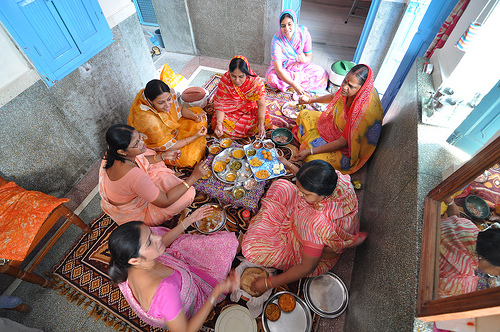Asian Aunties and Aquatics: What do China and India have in common?

By Tao Tao Holmes:
Collectively they comprise nearly 37 percent of the world’s entire population, the only two nations with over one billion people squeezed within each of their borders, along with thousands of years of the world’s richest history. Other similarities: lots of monkeys, delectably greasy flatbread, and ticklingly cheap tailor-made suits.
However, these are all backseat thoughts when it comes to the Dragon and the Elephant. What strikes me as most similar between these two marvelously complex countries has nothing to do with food or clothes or even a rising middle class; rather, it is a simple matter of bumbly aunts and public swimming pools.
Part I: The Aunties
In some (perhaps very abstract) way, China and India are like two enormous families. Not in the way that France is a family, cherishing and protecting its unique traditions and prizing its language above all others, nor in the way that one might consider Sweden a family, because blonde hair and handsome features seem to be shared across a national gene pool. Neither are they familial like the countries and places where a bedraggled backpacker will be warmly invited into a local’s home for some hot tea and cookies from the reserve cupboard, welcomed like a runaway nephew who has finally renounced his brash act of defiance but isn’t yet ready to crawl back to his parents. (Although, that said, one would probably find the same treatment.)
Rather, in China and India, everyone is automatically family because you naturally address them as such.
It’s a practice that I have always felt comfortable with and comforted by. In China, proper names are swiftly overlooked for the much more intimate and easier to remember designations of sister, brother, aunt, and uncle. In fact, I never paid the slightest attention to any Chinese friends’ or relatives’ formal names, as I only ever addressed them as “a-yi” (aunt), “shu-shu” (uncle), or one of the four terms for sibling (which depend on the age and gender of the addressee). Thus, every older Chinese lady becomes my aunt, whether or not she is, in fact, my aunt (and yes, I still frequently forget aunts’ actual names), and whether it is our first encounter or an instance where I should recognize her (but probably don’t) from all of the times we’ve met in the past.

My Chinese aunties are like immediate mother hens, cooing as they first look me over, then swiftly swooping in to preen my unkempt feathers and cluck at my stray pimples and superfluous body fat. With my a-yis, there are no boundaries for personal space and no room for vanity. Those are strictly antithetical to the purposes of an aunt. Under the one child policy, many of my Chinese aunties who were shafted with sons seem especially attentive to my well being and normally private personal details. Despite my extreme tomboyishness, I think twirling my long locks and asking about my marriage prospects still manage to more than satisfy them.
In India, I have been reminded of all my Chinese aunties just a little ways up north. Like with Chinese, Hindi has common terms for the general human family – brothers, sisters, aunts, uncles. Here, “didi” no longer designates a younger brother, as in China, but an older sister. (A few girls have taken to chirping Chinese didi whenever they see me, which I’m sure would cause all my Chinese a-yis to chuckle). My Indian aunties become Ruchira-ji and Garima-ji, with the two-letter suffix providing both a pleasing lilt and an indication of respect. If their names escape me, I can call them “chachi” and “daichi,” depending on their ages.

My adopted chachis and daichis, too, poke and preen, invasively but with only the kindest intentions. With no genetic aunt figure in sight, I enjoy their company and often am saved by it. My anonymous and ephemeral Indian auntie-jis have gone out of their way to ride the right buses with me, lead me through mazes of lopsided alleyways while their saris sweltered in the midday heat, and share their home-cooked food and chai.
When I venture back into the land of the American auntie, I find my personal boundaries oddly undisturbed, my pimples politely ignored and my superfluous fat carefully left unmentioned. The organic blueberries in the fridge are a bit pricey to be shared, but there are always some bagels or baked goods, if I’d like to help myself. There’s no chachi or daichi, or even a single a-yi here.
China and India can be unpalatable in many ways, but with endless Asian aunties around, it’s never so bad. Back home, I find, I dearly miss them and their annoyingly endearing ways.
Tao Tao Holmes ’14 is in Branford College. Contact her at taotao.holmes@yale.edu.